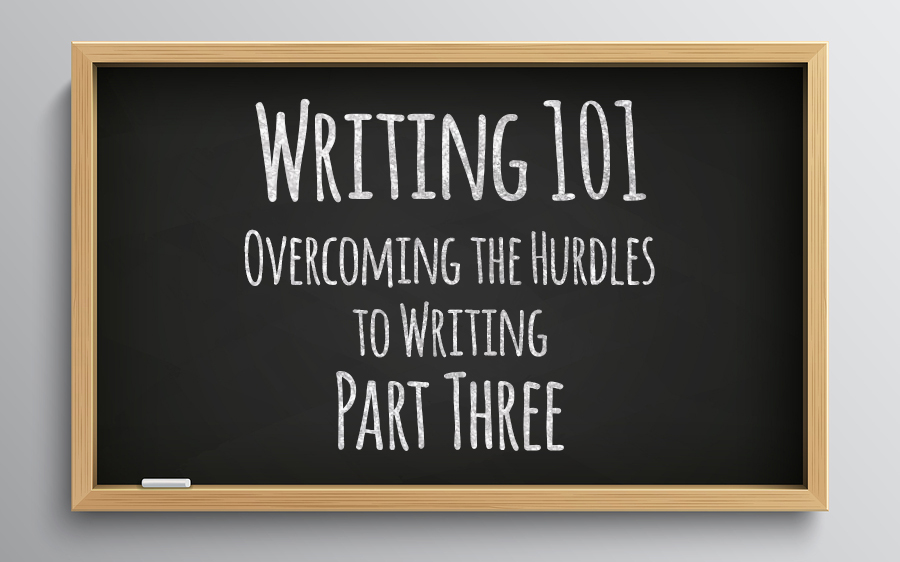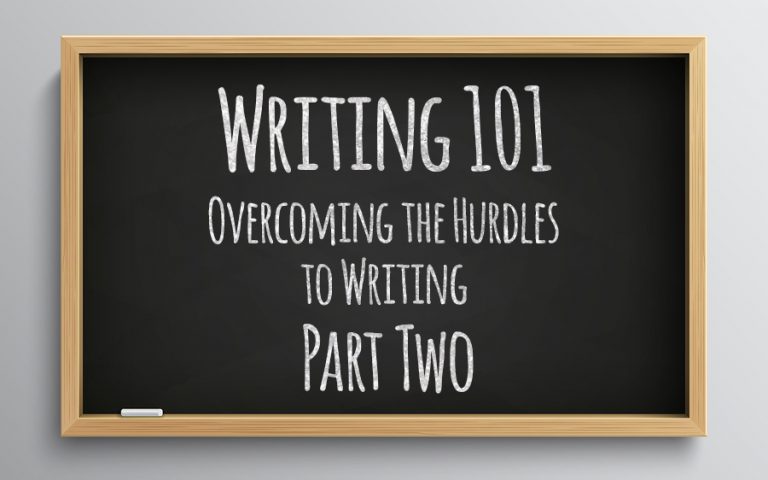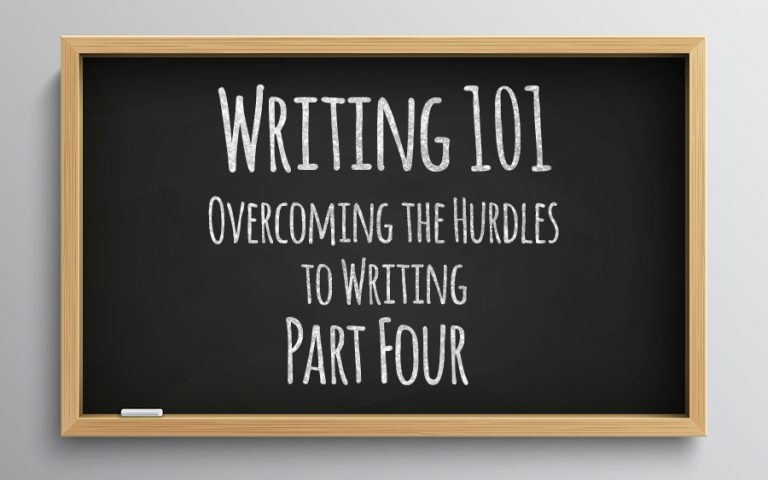Mastering Your Mind & Life: Overcoming the Hurdles to Writing – Part Three
In this third installment of our series on overcoming the hurdles to writing, Ginger explains the importance of having a routine and building habits – and then goes through some proven techniques on how to make those part of your own life. It’s another step towards breaking down the barriers keeping you from putting words down on paper, and moving you closer to achieving all of your writing goals.
In the first post of this series, I discussed how there are a host of practical and tangible issues that can get in the way of a successful writing career – and they go much deeper than just writer’s block. One of the most important steps you can take is to acknowledge your frustration, but hold yourself accountable to finding a solution to it.
In the second part of the series, I wrote about how you can supercharge your focus and productivity by holding yourself similarly accountable for your health and well-being – as even minor changes in your diet and lifestyle can make a big change to how much you actually get done.
Now we’re moving onto something I found really powerful – tips and techniques to make the most of the time and space you carve for yourself and your writing.
It’s my belief that all creative people balance on the knife-edge of chaos. I myself was diagnosed with ADHD last year, and I think it’s very clear that those manic episodes of ‘hyper focus’ and the distracted periods that proceeded and followed are one of the reasons I’ve found such solace in writing. The art of writing is, in some ways, my chance to place the chaos of my experience into the organization of a narrative. I have friends who are writers dealing with bi-polar disorder, depression, or are on the spectrum for Autism or Asperger’s. It’s not that you have to be crazy to be a successful writer – but I think there’s a reason so many stories exist about troubled writers, and also why so many creative people have found the peace they seek through the pursuit of their craft.
To be truly successful in this field, though, you need to temper the chaos that provides you with your creative ideas and passion within an order that actually allows you to get stuff written. For me, one of the biggest and most positive changes in my life was when it was explained to me that routine and habit were incredibly powerful tools for somewhat chaotic brains like mine; and can channel all that passion and creativity like the lens of a flashlight can focus light into a laser-like beam.
At the same time, it’s also a source of frustration for my spouse – who hates routine and petty rules. This is one of the areas of your life in which you have to embrace a certain selfishness; because if you don’t buckle down and do this, you’ll forever be a bright light burning in the darkness, rather than a focused beam cutting through towards your goals.
Step #3: Get Your Routine in Order
This is why, once your mindset and lifestyle are somewhat improved, the third angle that you need to approach has to be your routine – because it’s only routine that will help you make the most of the time you have available to write in.
Nothing else.
You see, here’s the thing: When you look at rich and successful writers and artists, it might appear as if the reason for their success is because they’re incredibly hard-working and disciplined – much more so than you, right?
But they’re not!
They’re actually just as brilliant, chaotic, disorganized and passionate as you – they’ve just learned to focus all of that power, and it’s helped them achieve what they have. At the end of the day, nobody who is richer, more successful or famous than you is better than you – they possess the same mental resources as you; including the same amount of willpower and discipline to achieve what you seemingly can’t.
So, how come they can achieve so much and you’ve haven’t – yet? Well, it’s because they’ve learned to take the step beyond relying on willpower and discipline alone to achieve their goals. They’ve learned that although it’s something you can train and improve, discipline is finite – as in, it’s a resource that you can and will run out of. This is why most of us start strong with our new year’s resolutions, but by the end of the first week of January much of our resolve will be flagging.
If you feel that way, remember – this is not your fault! You are not lazy for not being able to sustain the discipline to make positive changes to your lifestyle stick. Even the most successful people can and will run out of willpower. The only difference between you and them is that they’ve managed to make the positive changes that drive their success stick another way.
They just know tricks that you don’t!
So, here’s what their secret is when it comes to sticking to lifestyle choices that seem to require inordinate amounts of discipline: Habit.
You are, at the end of the day, driven by your habits. In the amazing book The Power of Habit by Charles Duhigg, the author reveals that habit is so deeply ingrained in your brain that it’s even stored in a different part of it than your memories; the basal ganglia as opposed to the hippocampus. Your habits are like the programs of a computer that run in the background – without you even thinking about them – and that’s what gives them such incredible power.
And the best part? You have control over these habits. In one example from the book, the author writes about a patient who lost his short-term memory when his hippocampus was damaged, yet he was able to learn and remember new habits by repeatedly doing them even though his active memory had no recollection of doing so.
So, the secret to making these life-altering changes is not to muscle through them with willpower – but to rewrite your basic human programming to turn them into habits.
New York times best-selling author Gretchen Craft Rubin writes self-help books that focus on improving your life, and one of the pieces of advice she gives is:
“We can use decision-making to choose the habits we want to form, use willpower to get the habit started, then – and this is the best part – we can allow the extraordinary power of habit to take over. At that point, we’re free from the need to decide and the need to use willpower.”
What does that mean, exactly? Well, once you decide on a course of action – like me getting up at 5am, for example – you use that limited resource of discipline to force yourself to do it just long enough until it becomes a habit. Once you’ve reached that point, you don’t need to be disciplined any more; you’ll be doing the positive thing automatically.
It takes about a month to form a new habit, and if you can force yourself to do the thing for thirty days, you might well find it effortless to continue afterward.
This is certainly how I ended up managing to stick to the things I do on a daily basis – getting up at 5am, doing daily exercise, and intermittent fasting. Now these behaviors are so ingrained in my brain that I don’t even think about them. I just get up, work out, and don’t eat – and I can use my willpower to focus on other things instead!
But none of that happened overnight – and it certainly didn’t happen all at once. Let me explain:
One Step at a Time
By now we should have established two things:
- You do have the power to change your life and make seemingly impossible, super-disciplined routines (like eating right, or going to the gym, or even just writing every day) a habit that’s so ingrained it’s actually more work not to do it.
- It takes discipline to turn a conscious decision into a habit; having to stick to it for thirty days or more using will-power alone, until it becomes coded into your basal ganglia like a subroutine in a computer program.
Now, here’s the thing – that’s totally achievable… but only if you budget your reserve of willpower appropriately.
Remember – whether you’re Arnold Schwarzenegger or Ronda Rousey or just you, you have a limited amount of willpower and discipline; and the trick to making any sustainable change in your life is to make sure that the change becomes habit before you run out of willpower to keep doing it.
This is why so many people’s New Year’s Resolutions fail – because instead of making one specific change to their life and sticking to it, they make multiple changes, all at once, and get burned out from trying to sustain them before any of them ‘stick.’
If your resolve is to go to the gym every day, and cut out sugar, and write 2,000 words every day – you’re going to run out of willpower before you’ve sustained any of those changes for 30 days. That’s why it’s so important to do things one step at a time – focus on one thing, and keep at that and only that until it sticks.
For example, I managed to achieve the changes I did by taking them slowly. I started off with the Intermittent Fasting, and I kept that up for a month. It got much easier really quickly when I saw the results, but I still focused on only that as a goal until my daily routine incorporated holding off food until mid-afternoon as a matter of course. It’s such a habit now that I don’t even think about it; and don’t get hungry during the day any more.
Next, I worked on waking up at 5am every day. That wasn’t so easy to make stick – in fact, it probably took two months (and a lot of failures) before I made staggering downstairs for some coffee a habit. These days I will generally wake up at 5am, and I’ve actually started to enjoy the peace, quiet and solitude of the the morning before my wife and kids wake up.
My friend who is a D&D fanatic refers to willpower as ‘mana’ and says that you only have a certain amount of daily and weekly ‘mana’ to spend, so make your lifestyle choices accordingly. That’s a good way to think about it; as it does make you start thinking about discipline in quantitative terms instead of just an esoteric thing.
It also makes you think consciously about what it is you want to change about your life, and which of those changes you prioritize – that, in itself, is a hugely valuable bit of introspection that can’t be overlooked.
Maximize Your Efforts
Gaining extra time to write is one thing – and making the lifestyle changes to get that time is vitally important. However, as I mentioned earlier, in addition to getting more time; you want to use the time you already have as effectively as possible.
Remember – the people who are massively successful, both as writers and beyond, have the same 24 hours in their day as you do. So how to they achieve so much more?
Part of it is routine. Part of it is carving out more time to dedicate to their ambitions. Even more of it is using the time they have more effectively. It’s just like the analogy of the guy with a shovel verses the excavator. Of course the truck is going to dig up more dirt – and not because the driver is ‘working harder’ than the guy with the shovel.
What will work for you varies, but here are some really powerful tips and techniques that changed my working routine and helped me achieve more than ever.
#1 – It starts the night before.
This is a trick I learned from reading 18 Minutes: Find Your Focus, Master Distraction, and Get the Right Things Done by Peter Bregman. The 18 minutes he speaks of are at the end of your working day – when you’re poised to pack it all in for the night.
Before you do, spend 18 minutes going through your to-do list for tomorrow. Actually WRITE DOWN a list of the things you need to, and want to achieve. Then organize that list by order of priority, and even go into your calendar and assign the periods of time you’ll dedicate to each task. The benefit of this is that when you go to work the following day, you’ll know exactly what to work on, and where to begin.
Doing this – especially when you’re tired and frazzled from a day of working – is as much a discipline that needs to be turned into a habit as anything else; but it’s worth it. It can really supercharge the amount you get done each day because you’ll start with your best foot forward.
#2 Eat That Frog!
Another great recommendation comes from Eat That Frog!: 21 Great Ways to Stop Procrastinating and Get More Done in Less Time by Brian Tracy. The focus of this book is the concept of looking at your to-do list for the day, and doing the thing you DON’T want to do first. The most difficult, gnarly, kidney-stone of a task… Tackle that FIRST. The sense of achievement from doing it will be incredible, and it means anything else you accomplish for the rest of the day will be a lot more enjoyable.
As an added suggestion, I was advised to look through my list and identify the ‘quick wins.’ These are tasks that won’t take much time to accomplish – the general rule is 5 minutes or less. This could be responding to a single, specific email, or mailing off a letter, or even just changing the ink in your printer. If a job is going to take less than 5 minutes, DO IT! Right then and there. You won’t lose much time out of your day, and you’ll get a huge buzz from actually achieving something.
Finally, an old boss of mine gave me a recommendation that’s stuck with me ever since: Identify three things on your to-do list, and consider your day a success if you accomplish those.
If you’re anything like me, you’ll have 20 things on your to do list – but my old boss warned me: “If everything is a priority, nothing is.” So identify the three most important things and focus on completing those. When you wrap up your day with your nightly to-do list, you’ll get a real boost by seeing some important tasks knocked off.
#3 Focus on one thing at a time.
There’s a great line from House of Cards, in which Frank Underwood asks his henchman: “How do you devour a whale?” The answer is: One bite at a time.
One of the problems in modern society is that we’re pulled in all sorts of different directions, and have multiple things to do. This often leads us – especially those of us with questionable attention spans, like myself – to become overwhelmed. We have so much to do that we end up doing nothing.
The best way to overcome this is the simplest – identify one task and focus on that job – and only that job – until it’s done. It’s a little counterintuitive and I know that when I started following this advice I panicked, thinking – “If I’m working on this task, I’m neglecting this other task.” But the fact is, chopping and changing between tasks delays completion of both. Focus on one at a time and you’ll at least get that done.
As I said – it’s a little stressful to implement at first, but once you get into this one-at-a-time mentality, you’ll be amazed what a positive change it makes and how much more you feel like you get achieved each day.
#4 Hack your attention span with the Pomodoro Technique
The Pomodoro Technique is so famous that you might have already heard of it. It’s named for a Pomodoro tomato – not a real tomato, but an egg-timer shaped like a tomato. It’s the brainchild of Francesco Cirillo, who set that egg-timer for 25 minutes and promised himself during that period he’d work on nothing but one particular task. He’d ignore his phone, forget about his emails, even abandon getting himself a glass of water or going for a pee. Nothing but the task in hand.
Why? Because no matter what it is (apart from breathing, perhaps) it can wait for 25 minutes.
After the timer rings, you set it for 5 minutes and then do whatever you want during that time – go pee, check your emails, post on Facebook. It doesn’t matter. Get all your distractions done during that five minutes… And then return to work for another 25 minute session of focused intensity.
This is a brilliant technique for silencing distractions, and it’s very manageable – utilizing the concept that willpower is finite, so you don’t have to stretch your discipline muscles too hard.
After three ‘poms’ you can take a 30-minute break, and then return to the egg-timer to start it all over again.
This technique works especially well in conjunction with suggestion #1, in which you make a to-do list and schedule your time the day before. Split your working day into an appropriate number of ‘poms’ (so, in an eight-hour day, you’d have 12 poms, including breaks) and then decide how you are going to occupy each one; remembering to Eat That Frog first!
Perhaps even better than the efficiency you’ll develop by adopting some of these techniques is the sense of control they give you. In Part One of this series I wrote about how the first and most important step in overcoming the hurdles that prevent you writing is the mental one – accepting that you are the person who has to be responsible and accountable for finding a solution to the practical and tangible problems that get in the way of your success.
When you start seeing the benefits and positive impact from the efforts you make, it’ll inspire you to make even more – and you’ll be amazed at how much your life improves as a result.
Next week, we’ll focus on the last and perhaps most important step in this process – and that’s when you look outward from all these personal changes, and begin tackling the external issues that prevent you from achieving your goals. Stay tuned!












2 Comments